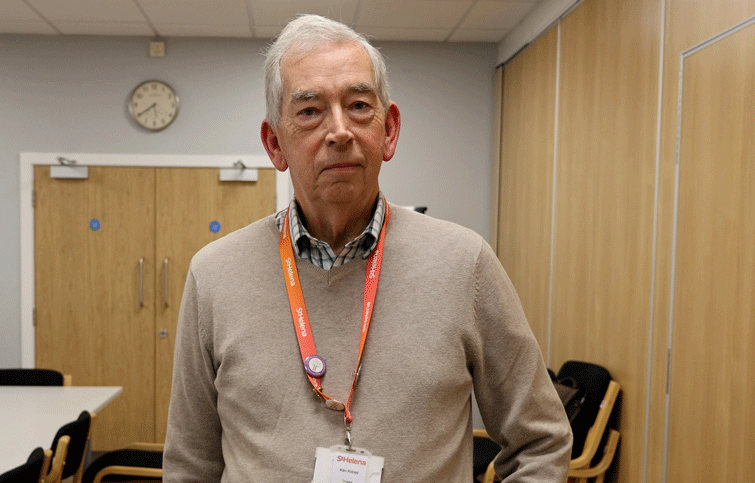Make a difference
People like you help us every day through regular donations
Read stories Donate
I'd heard of St Helena Hospice but didn’t have much of an idea of what they did, I wasn’t even sure where it was. I was aware that it existed because when we first moved to Colchester in 1984, it was when the initial big fundraising exercise was happening so I would have seen it in the local paper.
None of the people in my family had ever used a hospice, so it was just a name I was familiar with, nothing more. And life was really nice and rosy… until in 1997, my wife found she had breast cancer.
It was a huge shock to us because we’d never had any illness before so we were fairly naïve as far as the health system was concerned. She had a mastectomy and chemotherapy, and appeared to have gone away and we thought that was great.
And then about three or four years later another lump appeared. So another operation, more chemotherapy and more radiotherapy. And again we thought it had gone but it came back in her bones which we were told was not going to go away. And that was about the most traumatic event I’ve ever had in my life.
It completely changes your world view around, so you’re worrying about fairly inconsequential things like what colour to paint the living room or where to go on holiday, and suddenly all that is swept away now you’re looking at health and treatments and medications and hospital appointments.
We really were not sure what to do. We felt fairly on our own. I was still going to work because we still had the bills to pay, but Ann was needing quite a lot of care at that time, so I was working and rushing home and being a carer, and doing the shopping and the housework.
Looking back, we were just so naive about what support was available and I was surprised how little information we got about some of the things. We didn’t even know the questions to ask never mind understand the answers. I didn’t realise we could get medication prescriptions delivered, so I’d rush home from work, get Ann some tea and then rush off to the chemist to get her prescription. I didn’t realise I could have got that organised, nobody had ever mentioned it. Standing in a queue at the pharmacy was a real pain when I really wanted to be at home with Ann.
It was a very, very sharp learning curve. It’s difficult to describe to somebody who has not been there, how lonely and exposed you feel having the responsibility of caring for somebody without the knowledge that you need and no back up. You just feel totally on your own and hoping that nothing is going to happen. I wish SinglePoint had been there at the time. I would have paid a lot of money to have had that there.
It’s strange being a carer, because in one respect you are an amateur and in another respect you are an expert where the other person is concerned. So I think sometimes when a carer says to a professional ‘I think this is serious because it’s never happened before’, they’re in the position to know that something’s not normal and yet quite often they’re not listened to.
I couldn’t believe how stressful it was and I didn’t appreciate how much toll it took on me. I think when Ann died, I didn’t feel back to normal again for at least six months. I was absolutely exhausted. I was running on empty both mentally and physically but without realising it.
So that carried on for nearly a year, and then things deteriorated fairly rapidly. I always remember, her nurse visited and found Ann in quite a confused state. She arranged for Ann to go into the Hospice to see if she could become stabilised, which was a bit of a shock because we suddenly thought, oh gosh that’s the next level.
So we went along to the Hospice, at which time I thought I was coping all right but I didn’t realise how near the edge I was. It was the first time somebody spoke to us separately; a nurse did an assessment of Ann and a different nurse took me to one side and asked me how I was getting on. Nobody had ever done that before, and I’ve never forgotten that. In fact, all I did was burst into tears and just say how awful it all was, how I didn’t quite understand what was happening, and questioned why it was all happening. I just thought it was wonderful someone asked me. Everybody just focuses on the patient and sometimes sort of ignores the fact the partner is probably under equal but different issues and stresses.
Ann was not in a particularly good place at the time but, I’ll always remember this, she walked through the door with me and the first two things we saw were the cat, she loved cats, and the drinks trolley, and she said ‘oh, I think I’m going to like it here!’ Then she visibly relaxed.
The other thing was someone asked her if she would like lunch and she asked for some fresh pineapple and I remember thinking, well you’ve no chance of that. But within five minutes a plate of fresh pineapple arrived. I think things like that make all the difference. It just made us think, this is somewhere special.
Ann was in the Hospice for a couple of weeks and then things really deteriorated. And then on 12th April 2005, she died. I was there when she died and it was peaceful. I’d never seen anybody die before; nobody in my family had died in my memorable lifetime. I think you worry about what you don’t know, the fear of the unknown, but it was very calm and very peaceful. Nice is not the right word I suppose, but… yes, it was a nice death.
At that point I just remember going home and thinking, I just don’t know what to do now. You literally go from running around with no time to stop to draw breath, to suddenly having nothing to do. It was just a huge change from being totally stressed because you are trying to do everything at once, to just wondering what you are going to do. It was like falling off a cliff. It’s quite difficult to explain. I just remember thinking I had no reason to even get out of bed. And then the cats came upstairs and said they wanted their breakfast and that was the reason to get out of bed.
And then a very nice man phoned up from St Helena who said he was a bereavement counsellor and was I interested in talking to him. I thought that was really nice so I said ‘yes please’. He phoned every week and we would talk about anything and everything; sometimes about Ann, quite often about how I was doing, what I planned to do. He was a great walker and I like walking so we’d talk about walks. It was lovely. I think it was very valuable indeed and lovely to talk to somebody who was not a close friend or a family member, but just somebody who you could say anything to at all. I was very grateful for that service which prior to this, I didn’t even know existed.
It is now many years since the hospice looked after my wife yet it is not something you ever forget. In hindsight I don’t know how we would have coped without their amazing support. I have been involved with St Helena in a variety of ways ever since and was honoured to be asked to become a trustee in 2012, which is a role I continue to carry out. Despite a busy life, I try to help with the hospice fundraising events whenever I can and I have also left a gift to the hospice in my Will. Setting it up was no trouble and certainly much less effort for me than doing the Pier to Pier Walk! 
This story may not be published elsewhere without express permission from St Helena Hospice.

When you make a donation to St Helena Hospice, we are charged transactional fees by other companies, including fees for processing payments made to us, looking up addresses and validating bank account details.
We are very grateful to our donors who offer to offset some of these fees with a minor addition to their total amount. This is however completely optional and we are very grateful for your support whether or not you choose to contribute to processing fees.
CloseWe are able to claim an extra 25p on every £1 on your donation amount for no extra cost to you, as long as you are a UK tax payer; have paid enough income tax or capital gains tax in that tax year; and are donating your own money. If you pay less income tax and/or capital gains tax than the amount of Gift Aid claimed on all of your donations in that tax year it is your responsibility to pay any difference. For more information about Gift Aid, please visit https://www.gov.uk/donating-to-charity/gift-aid
